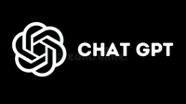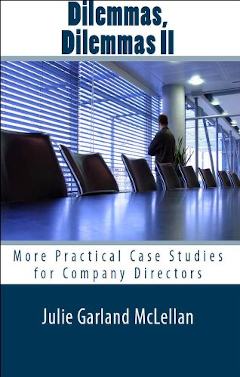|
|
|
|
|
|
|
|
|
Dear reader,
Welcome to The Director’s Dilemma August 2024
Every month this newsletter looks at a real-life board scenario and considers a range of responses. The scenarios are de-identified to protect the individuals concerned. This month we think about what to do if we suspect a colleague may be dangerously overcommitted.
Does your board need practical help? The scenarios in this newsletter are general, I work with boards and directors as a confidential mentor to provide director training and development, board performance reviews, and specialist training in writing board papers for executives. If you would like personalised service, please contact me.
To read this email in a web browser, go to www.mclellan.com.au/newsletter.html and click on 'read the latest issue'. I hope you will enjoy the latest dilemma:

Pedro is on the board of two NFP organisations. One of his colleagues from his smaller board recently applied to join the larger board and Pedro, as a member of the nominations committee, has been shown the CV.
Pedro was shocked when he read the CV and found out that his colleague currently sits on 7 other boards and 5 government committees alongside their regular employment! This would be their 13th commitment. The vacancy was advertised only recently, long after the colleague joined Pedro's smaller board. Clearly Pedro's board colleague is still looking for more board roles.
The colleague is not underperforming, but they are not exactly knocking it out of the park in terms of performance. Until now, Pedro just chalked it up to them being new to the board and earlier in their board career, but now he wonders if they really have time to meet all those commitments.
Maybe it's none of Pedro's business; should he do or say anything? If so, what and how?
|
|
|
|
Graeme's Answer

First, the question of number of boards or committees. This person is on way too many when he also has a full-time job. Five to six boards or committees is enough for a director - NFP or otherwise. This does not include board committees or subsidiary boards. Anymore and you just cannot keep up with the careful reading of board documents, as well as the observation of the broader community which needs to be done to bring a proper strategic view. If you are also holding down a job this number would be lower.
Also, the scheduling of meeting attendance would be a nightmare, inevitably resulting in poor attendances.
So, what does Pedro do? Given our over-committed board member's CV I would not consider them for a new board commitment. They just won't be able to contribute to an appropriate level given their time constraints.
But what about the smaller board where they serve, and Pedro is a member? Once the level of over -commitment is in Pedro's knowledge, I would raise it with the board chair. They may feel that a quiet chat is required and, based on the person's performance, the suggestion that they may re-assess their portfolio.
Graeme Innes AM is Chair of Attitude Foundation, Board Member of NSW State Insurance Regulatory Authority, Joblife, and Life without Barriers. He is a former Commissioner of the Australian Law Reform Commission and is based in Sydney, NSW, Australia.
|
|
|
|
Julie's Answer

Pedro must not use information gained from his position on the board of one company to benefit any other person or organisation; not even his other board. He may only use the information for the purpose for which it was given - recruiting to that board.
Hopefully every reader will agree this CV shows a dangerous number of commitments and likely a resulting lack of director due diligence. Pedro should not put the candidate forward for the open role.
However, Pedro now knows something that is of strong interest to his other board and faces a dilemma - breach confidentiality and mention this information to his Chair, or remain silent knowing that a board colleague may not be up to the task?
Without breaching confidentiality, Pedro can suggest that his boards both develop a register of director interests which would list all the boards and committees of all directors. That would be good governance.
He could also suggest that the boards undertake a governance or board evaluation which could also highlight the issues; especially if he asks the consultant to investigate how much time each director gives to his or her role.
Only Members can remove a director from the board, not the chair or other directors. Pedro could be brave and speak directly with his colleague to explore what is going on and how the colleague is managing the commitments to these roles. He could encourage him to step down from a few roles to make space for his board. However, this conversation must be carefully nuanced to avoid a strained relationship that will make matters worse. Ideally the director would recognise the issue and step down, but life is not always ideal.
Julie Garland McLellan is an experienced non-executive director and board advisor based in Sydney, Australia.
|
|
|
|
Lauren's Answer

As a member of the Nomination Committee, Pedro has the shared responsibility for ensuring that new board members are positioned to add value to the board and have the bandwidth to be fully contributing members.
In addition to evaluating the background and skill sets of potential board members, the Nomination Committee must look at the number of other obligations that prospective board members have and determine whether they are likely to become a productive board member.
Twelve other outside commitments for a working executive appear to be too many for a board candidate and indicate that he is overextended and is a reason not to further someone's candidacy.
This is a good opportunity for Pedro to flag the issue of prospective candidates being overcommitted.
Pedro can also use this situation as an opportunity to engage with the committee to answer questions about the expectations of board members:
1. What are a board member's obligations?
2. What is the time commitment for board members, including preparation for meetings, participation in events, and any additional tasks?
3. What is the frequency and length of board meetings and what percentage are board members expected to attend?
4. Can board members add value outside of meetings by contributing through fundraising or giving the board access to their contacts?
5. How might overcommitted board members impact the organization's reputation and board effectiveness?
6. Are we clearly communicating board member expectations when we identify and onboard new board members?
7. Are we implementing a vetting process and continuous evaluation to ensure that board members are meeting their commitments and adding value to the organization?
By addressing these questions, Pedro can help the committee develop a clearer understanding of the expectations and commitments required for board members, which will aid in selecting candidates who are well-suited and fully capable of contributing effectively.
Lauren E. Smith is Managing Partner and Co-Head, Board Practice, Diversified Search Group. She is the current Chair Governance and past President of the NACD Florida Chapter. She is an NACD Board Leadership Fellow and an NACD Certified Director. Lauren is a board member of the Greater Miami Chamber of Commerce. She is based in Miami, Florida, USA.
|
|
|
|
Chat GPT's Answer

Pedro is right to be concerned. Here are some points Pedro could consider:
1. Board Commitment and Overload: It's concerning that the co-board member is already involved in numerous other boards and committees. Serving on multiple boards and committees can stretch one's time and attention thin, which might affect effectiveness and contributions.
2. Performance and Contribution: Pedro mentions that the co-board member is not underperforming but also not excelling. This could be a result of being spread too thin across multiple commitments. Boards benefit from directors who can dedicate sufficient time and focus to their roles.
3. Governance Responsibilities: It's within the board's responsibility to ensure that each director can fulfill their duties effectively. Overcommitment can compromise this effectiveness.
4. Approach to Addressing the Issue: Pedro may start by discussing his observations and concerns in a private conversation with the co-board member. It's important to frame the discussion around ensuring that each director can contribute meaningfully to the board.
5. Board Dynamics and Impact: Pedro should also consider the impact on board dynamics. If one director is excessively committed elsewhere, it might affect decision-making processes, attendance, and overall board cohesion.
6. Potential Solutions: Pedro could suggest that the board discusses director commitments and assesses whether each member has the capacity to fulfill their duties effectively. This could be part of a broader conversation on director effectiveness.
7. Professionalism and Courtesy: It's crucial for Pedro to approach this matter with professionalism and courtesy. The goal is to ensure that the board functions optimally and serves its stakeholders well.
In summary, while it may not be directly Pedro's business, as a concerned director, he has a responsibility to ensure the board operates effectively. Addressing the issue with sensitivity could lead to better governance practices and a more productive board environment.
Chat GPT is an artificial intelligence (or a pattern recognition, data analysis, and prediction engine). It resides in Cyberspace.
|
|
|
|
Masterclass on Writing Better Board Papers
The next scheduled deliveries are:
8 August, Melbourne
https://www.eventbrite.com.au/e/writing-better-board-papers-melbourne-8-august-2024-tickets-781201654177
12 September, Sydney
https://www.eventbrite.com.au/e/writing-better-board-papers-sydney-12-september-2024-tickets-871383199607
Click on the above links to book your place.
If you would prefer an in-house workshop for your executive team, please reply to this email and I will gladly schedule one for you.
Book review - Dilemmas, Dilemmas II: More Practical Case Studies for Company Directors (Volume 2)

This book by one of Australia's leading boardroom experts allows directors to practise and develop their judgement. Contributions from international governance experts, including directors, advisers, consultants, and academics provide insights that extend and enhance the ability of the reader to respond to situations that arise in boardrooms.
Directorship is about judgement and this book provides a range of responses from which readers can rapidly assess and enhance their own responses to more effectively meet the challenges of their own board roles. These case studies are drawn from real life. They are up-to-date, entertaining and educational. They will make you a better director!
With contributions from around the world and examples of applying good governance to commercial, family, not-for-profit and government sector boards this book is an authoritative and comprehensive source of inspiration for experienced and aspiring directors.
Buy this book at Amazon
Board reviews - Every board - just like every other team - needs to measure its performance if it hopes to improve. When your board next needs to conduct a performance evaluation or a governance review, please remember that I would be delighted to help. You can contact me at julie@mclellan.com.au.
Inspirational quote for August

A note on names - A note on names - A few readers have asked me where I find the names for the protagonists in each case study; I 'borrow' them from people I meet or things that I read. The name Pedro is derived from the Latin name "Petrus", which means "rock" or "stone". The meaning of Pedro reflects strength, stability, and dependability. The name symbolizes a person who is unwavering and strong-willed - just as our protagonist will need to be.
Video resources - I post short video insights on LinkedIn. They disappear after a few days. You might like to visit (and please subscribe to) my YouTube channel to see the videos whenever you want to watch them. Let me know if there are any topics you would like to see addressed.
This newsletter - If you have any ideas for improving the newsletter please let me know. If you are reading a forwarded copy please visit my website and sign up for your own subscription.
Suggestions for dilemmas - Thank you to all the readers who have suggested dilemmas. They are greatly appreciated. I will answer them all eventually. I could not write this newsletter without your help and without the generous help of all the experts who respond each month to the case studies.
Be a contributor - if you would like to attempt a response to the dilemmas for publication you will be most welcome. Simply reply to this email and let me know. I am always on the lookout for new talent from around the world so please reach out if that sounds like something you could do. I am also always grateful for the generous sharing of the current and past contributors. I couldn't create such an engaging newsletter without their help.
Spread the word - if you have read this far, I assume you enjoy the newsletter - please help me to reach more directors by sharing the newsletter with your board colleagues and suggesting that they also become subscribers or by posting a recommendation on my LinkedIn page to let others know that you find the newsletter valuable.
Let's connect - I use LinkedIn to share information about boards and directorship with my friends and acquaintances. If you use LinkedIn and we are not yet connected I will welcome a connection from you. You can find me at linkedin.com/in/juliegarlandmclellan.
Farewell until the next issue due 1 September 2024. I look forward to greeting you again then.
Enjoy governing your companies, it is a privilege!
Best regards,
Julie

Main Photo by Andrea Piacquadio from Pexels.com
Quote Illustration by Julie Garland McLellan
Disclaimer - The opinions expressed above are general in nature and are designed to help you to develop your judgement as a director. They are not a definitive legal ruling and do not constitute legal advice. Names and some circumstances in the case study have been changed to ensure anonymity. Contributors to this newsletter comment in the context of their own jurisdiction; readers should check their local laws and regulations as they may be very different.
Privacy - I am privileged to have your contact details and keep them as safely as possible. I will alert you if they are ever accessed by any unauthorised person (the technical staff at ayuda help with publishing and issuing the Director's Dilemma and have access so they can send the newsletters to you). I do not sell your details to anyone; they are kept only for the intended purpose - sending you this newsletter and helping to build the judgement of company directors by providing a safe way to consider potential responses to real life events.
|
|
|
|
|
|
|








